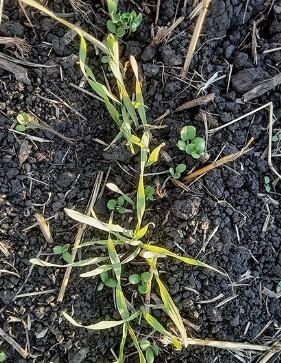By Steve Koppes
Purdue University has received a four-year, $1.5 million grant from the U.S. Department of Agriculture’s National Institute of Food and Agriculture to explore the ecology of organic cropping systems in Indiana, Illinois and Wisconsin.
Purdue, in collaboration with the University of Wisconsin-Madison and Western Illinois University in Macomb, will assess weed, insect and pathogen pressure on corn, soybeans and small grains cultivated under standard and ecologically intensified organic farming systems, along with comparing yields across systems.
“In the ecologically intensified approach we try to harness as many of the benefits that nature and ecology provide as we can, all to improve soil health and minimize erosion,” said Christian Krupke, a professor of entomology in Purdue’s College of Agriculture. That includes using inoculants — microbial enhancements — on the seed, planting crops that attract beneficial insect predators and testing novel crop rotations.
“Ecology is happening no matter what,” Krupke said. “Our challenge as researchers and farmers is to harness more of that ecology for our benefit.”
The fieldwork will take place at the Northeast Purdue Ag Center, the University of Wisconsin Arlington Agricultural Research Station and the Western Illinois University Allison Organic Research and Demonstration Farm.
“Cool beans!” exclaimed soybean specialist Shawn Conley, professor of agronomy at the University of Wisconsin-Madison. “Wisconsin has an extensive number of organic dairy farmers, and soybean is a key protein source for these farmers,” he said, noting that his state leads the nation in organic field crop acreage.
"This is an exciting opportunity to expand our work with the organic community in Wisconsin and beyond.”
The collaboration will enable the three universities to study ecological processes at work in organic farming systems more intensively than ever before, said Joel Gruver, professor of soil science and sustainability agriculture at Western Illinois University.

This crimson clover with cereal rye is being organically farmed in a collaborative project involving Purdue University, the University of Wisconsin-Madison, and Western Illinois University.
“Historically we have primarily focused on ‘what’ and ‘how’ to do organic farming effectively. For example, how to control weeds and supply nutrients,” said Gruver, who also directs WIU’s Organic Research Program. “This collaboration will allow us to take an integrated look at ‘why’ and ‘how’ questions. For example, why does biodiversity contribute to ecological functions like biocontrol and nutrient cycling, and how can we capture the benefits of biodiversity more effectively in organic systems?”
Driving the collaboration is the desire to make U.S. row-crop agriculture more sustainable for the long term. “Sustainable” in this context includes “smart agriculture,” “regenerative agriculture” and other such terms.
“The bottom line for all of them is that things are changing rapidly, both on the side of consumers, who ask and pay more for organic produce and meat, and on the side of farmers, who are very interested in these new ideas,” Krupke said. “We’re trying to do what the most progressive growers might do and then compare that to a conventional organic approach, which many growers are already embracing.”
One example is planting buckwheat and cowpea in association with corn and soybeans.
“We want to experiment and see what kind of insects we may attract that may change the communities present in those fields,” Krupke said. An underlying aspect of the work is to diversify the fields.
“Theoretically, a system that’s more ecologically diverse, that has more buffers and more redundancies against invasions by pests and pathogens, should be more able to withstand those invasions.”
The standard and ecologically intensified organic farming regimes will be tested at both university-owned research farms and commercial organic farms in all three states. The university researchers will transfer what they learn on their 5- and 10-acre fields to cooperating commercial growers to see if they can achieve the same performance on much larger fields.
The Purdue team includes Ashley Adair, an Extension organic agriculture specialist in Horticulture and Landscape Architecture; weed scientist William Johnson, a professor of botany and plant pathology; Michael Langemeier, a professor of agricultural economics and associate director of the Center for Commercial Agriculture; and Darcy Telenko, an assistant professor of botany and plant pathology.
“Organic growers in Indiana are creative,” Adair said. “They’re always pushing the envelope in terms of what’s possible in organic grain production. They’re trying new ideas that look beyond what the current researchers have investigated.”
The involvement of such creative and adaptive growers is critical to the project’s success.
“We know what we want to measure and how we want to measure it, but is our crop sequence practical?” Adair asked. Will the research team’s intercropping plan — growing more than one type of crop close together — work for growers in different locations with different soil types and weather conditions? Does the team’s plan make economic sense, and will farmers be able to market the crops grown for this study in their area?
“These and many other questions can be answered by involving farmers as research collaborators and will help us, as Extension professionals, provide evidence-based and nuanced advice to clientele pursuing organic practices on their farms.”
Source : purdue.edu